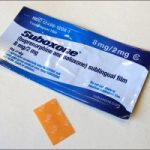Do I Need Inpatient Care for Suboxone Addiction?
Normally, most individuals with opioid addiction do not require inpatient care. However, the severity of one’s condition may increase the necessity for a more intensive treatment option like inpatient care, and addiction to a drug like Suboxone does often occur in one who has already struggled with addiction for a long time. Ultimately, it depends on the specific individual and their needs when it comes to whether or not inpatient treatment is necessary for Suboxone addiction.
Suboxone and Its Abuse
Suboxone contains both buprenorphine and naloxone. According to the National Library of Medicine, “buprenorphine is in a class of medications called opioid partial agonist-antagonists and naloxone is in a class of medications called opioid antagonists.” Naloxone was combined with buprenorphine to create Suboxone in order to minimize the likelihood of the drug’s misuse; whenever someone crushes a Suboxone tablet and injects it, the naloxone inside is meant to immediately precipitate withdrawal. Unfortunately, this does not stop some individuals from abusing Suboxone.
According to the National Drug Intelligence Center, “Despite safety measures in place to guard against diversion of the drug, illegal distribution and abuse of buprenorphine have been reported in the United States, primarily in the Northeast region.” Abuse of this drug can be dangerous and, just like with other opioid drugs of abuse, can even lead to addiction. The solution, no matter what type of opioid the individual is addicted to, is safe, well-rounded treatment that caters to the needs of the individual.
Opioid Addiction and Outpatient Care
Often, opioid addiction lends itself well to outpatient care. It does not usually cause severe psychological disturbances, nor does it often cause the kind of intense physical effects that require long-term, inpatient care. The National Institute on Drug Abuse states, outpatient treatment “costs less than residential or inpatient treatment and often is more suitable for people with jobs or extensive social supports,” which means it could be beneficial for you if your life fits this description.
However, Suboxone addiction may not lend itself as readily to outpatient treatment as other types of opioid addiction. It is important for every aspect of a person’s needs to be considered before they decide on a treatment option, and that person being addicted to Suboxone instead of another prescription opioid agonist is definitely important information to consider. You may realize that you require inpatient or residential care after all, once you consider the severity of your condition.
Suboxone Addiction Isn’t Usually a Short-term Problem
Those who become addicted to Suboxone often have had an issue with opioid abuse for many months, more often even years. This is because Suboxone itself is a medication that is normally prescribed to treat opioid addiction, and those who abuse it usually do so because they have relapsed back to drug abuse. Relapse can occur, and does occur often during recovery, and isn’t always an indicator of especially severe addiction issues, but it can be, especially if it continues to happen over and over again.
In addition, other opioid drugs of abuse are often easier to obtain and create a stronger high for the individual. Abuse of and addiction to Suboxone often indicates that a person is going to great lengths in order to obtain a relatively small high and a likelihood that they are abusing the treatment that is meant to help them.
The Indications of Suboxone Abuse as Related to Treatment
If the individual who was abusing Suboxone has been receiving it through a doctor’s office (often the preferred method of treatment as it allows many more individuals to receive access to medication than attending clinics daily), it may be time for that person to try inpatient care.
Serious Suboxone abuse often indicates that the individual has not been as successful as they may have hoped with a less intensive treatment program and that they are still desperate for the high they are able to obtain from opioids. It is likely they will continue relapsing or abusing their medication if they are not in a more intensive facility where behavior is heavily monitored. This is not to say that every individual who begins abusing Suboxone is a more severe addict than those who do not, but the behavior does often indicate a struggle where the individual cannot stop abusing opioids or does not want to. Inpatient treatment could be very helpful at this stage.
Other Indications that Inpatient Treatment May Be Necessary
Polydrug abuse is one such indication that inpatient treatment may be necessary at this time. Individuals who abuse Suboxone and other drugs together could be endangering themselves more intensely, and overdose could be a likely result as well as severe addiction to more than one substance. According to the US Food and Drug Administration, “Patients should be cautioned that a serious overdose may occur if benzodiazepines, sedatives, tranquilizers, antidepressants, or alcohol are taken at the same time as Suboxone,” and those who engage in this behavior often are endangering themselves at an extreme level.
The presence of psychiatric issues, including mood and other mental disorders, can also indicate a person’s need for inpatient care. If an individual has been struggling with depression, bipolar disorder, anxiety disorders, schizophrenia, or another psychological disorder for a long time in addition to their addiction, it is likely that these disorders are intertwined and the person will need intensive treatment for both, the kind that is only available in inpatient care.
Individuals who do not have a strong social support system at home will often get better results by attending inpatient care as well. The treatment itself is also safer for those who might be struggling with suicidal thoughts or who have a strong chance of relapse, as it places them in a controlled environment with 24-hour care.
Do I Need Inpatient Treatment for My Suboxone Addiction?
In the end, whether or not you need inpatient care comes down to you and your specific needs as well as your comfort level with inpatient treatment. Call 888-646-0865 (Who Answers?) , and we can help you determine the treatment option that will best fit your needs as well as find the right program for you.






